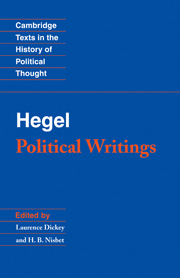Book contents
- Frontmatter
- Contents
- Editors' note
- General introduction
- Chronology of Hegel's life and career
- Translator's preface
- List of abbreviations
- The Texts
- The Magistrates should be Elected by the People (1798)
- The German Constitution (1798–1802)
- On the Scientific Ways of Treating Natural Law, on its Place in Practical Philosophy, and its Relation to the Positive Sciences of Right (1802–1803)
- Inaugural Address, Delivered at the University of Berlin (22 October 1818)
- Address on the Tercentenary of the Submission of the Augsburg Confession (25 June 1830)
- Lectures on the Philosophy of History (1827–1831)
- The Relationship of Religion to the State (1831)
- On the English Reform Bill (1831)
- Editorial notes
- Glossary
- Bibliography of works cited in this edition
- Index of names
- Index of subjects
- Cambridge Texts in the History of Political Thought
The Relationship of Religion to the State (1831)
Published online by Cambridge University Press: 05 June 2012
- Frontmatter
- Contents
- Editors' note
- General introduction
- Chronology of Hegel's life and career
- Translator's preface
- List of abbreviations
- The Texts
- The Magistrates should be Elected by the People (1798)
- The German Constitution (1798–1802)
- On the Scientific Ways of Treating Natural Law, on its Place in Practical Philosophy, and its Relation to the Positive Sciences of Right (1802–1803)
- Inaugural Address, Delivered at the University of Berlin (22 October 1818)
- Address on the Tercentenary of the Submission of the Augsburg Confession (25 June 1830)
- Lectures on the Philosophy of History (1827–1831)
- The Relationship of Religion to the State (1831)
- On the English Reform Bill (1831)
- Editorial notes
- Glossary
- Bibliography of works cited in this edition
- Index of names
- Index of subjects
- Cambridge Texts in the History of Political Thought
Summary
[Editorial note: The following excerpt is from the lectures on the philosophy of religion which Hegel delivered in the summer of 1831, only a few months before he died. He had, of course, been concerned for some time with the way in which Catholicism and Protestantism functioned as political ideologies in the modern world – for example, in AC and PH, and in the additions he made to the third edition of his Encyclopedia of the Philosophical Sciences. But although he had delivered his lectures on the philosophy of religion on several previous occasions, it was not until the 1831 series that he included the topic covered in this extract, namely ‘The Relationship of Religion to the State’. For a full discussion of the place of this topic in the series as a whole, see Hodgson's remarks in Hodgson 1984: vol. 1, pp. 77–81.]
1. The state is the true mode [wahrhafte Weise] of actuality; in it, the true ethical will attains actuality and the spirit lives in its true form [Wahrhaftigkeit]. Religion is divine knowledge, the knowledge which human beings have of God and of themselves in God. This is divine wisdom and the field of absolute truth. But there is a second wisdom, the wisdom of the world, and the question arises as to its relationship to the former, divine wisdom.
In general, religion and the foundation of the state are one and the same thing – they are identical in and for themselves.
- Type
- Chapter
- Information
- Hegel: Political Writings , pp. 225 - 233Publisher: Cambridge University PressPrint publication year: 1999

